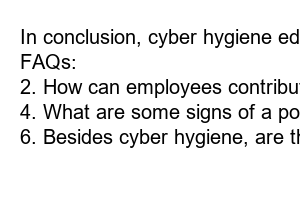세탁업 사이버 위생교육
Title: The Importance of Cyber Hygiene Education in the Laundry Industry
Introduction:
In today’s digital world, the laundry industry is no exception to the increasing vulnerability of cyber threats. As technology evolves, laundry businesses must adapt by integrating robust cyber hygiene practices. By understanding the significance of cyber hygiene education, laundry business owners can safeguard their operations, protect customer data, and maintain trust in an increasingly interconnected world.
1. What is Cyber Hygiene?
Cyber hygiene refers to the practice of implementing proactive measures to maintain the security and integrity of digital systems. From utilizing strong passwords to regularly updating software and educating employees about phishing and social engineering, **cyber hygiene acts as a vital defense** against cyber threats.
2. The Risks Faced by the Laundry Industry:
The laundry industry’s increasing reliance on digital systems exposes them to various risks, such as data breaches, ransomware attacks, and other types of cyber-attacks. **Consequences may include financial losses, tarnished reputation, and compromised customer relationships**.
3. Importance of Cyber Hygiene Education in the Laundry Industry:
**By providing comprehensive cyber hygiene education to employees**, laundry businesses can foster a security-conscious culture, identifying potential risks, and implementing preventive measures. Empowering employees with the knowledge to detect, report, and respond to cyber threats is crucial in safeguarding the business against potential breaches.
4. Addressing Employee Vulnerability:
Employees are often considered the weakest link in cybersecurity. With phishing emails becoming increasingly sophisticated, laundry businesses must educate employees on **identifying phishing attempts and other social engineering tactics**. By training employees to discern suspicious links and emails, laundry businesses can significantly reduce the risk of a cyber-attack.
5. Protecting Customer Data:
Laundry businesses collect and store customer data, including payment information and personal details. Cyber hygiene education ensures that employees understand their responsibility in maintaining the utmost security and confidentiality of customer data. **Implementing encryption, ensuring secure payment gateways, and regular data backups** are essential steps in protecting customer information.
6. The Role of Cybersecurity Tools:
To bolster cyber hygiene practices, laundry businesses should also invest in **advanced cybersecurity tools**. These tools can provide real-time threat monitoring, network protection, and antivirus software. Regular audits and vulnerability assessments should also be conducted to identify potential weaknesses and take appropriate action.
Summary:
In conclusion, cyber hygiene education is paramount for the laundry industry to navigate the digital landscape securely. By training employees, raising awareness, and implementing robust cybersecurity measures, laundry businesses can safeguard their operations and customer data. As cyber threats continue to evolve, staying updated on best practices and investing in cybersecurity tools is essential to fortify against potential attacks.
FAQs:
1. What is the biggest cyber threat faced by the laundry industry?
2. How can employees contribute to maintaining cyber hygiene in the laundry sector?
3. Are there any specific cyber hygiene practices for laundry businesses that deal with customer data?
4. What are some signs of a potential phishing attempt?
5. Is cyber hygiene education a one-time training process, or should it be an ongoing effort?
6. Besides cyber hygiene, are there any other security measures laundry businesses should implement?

